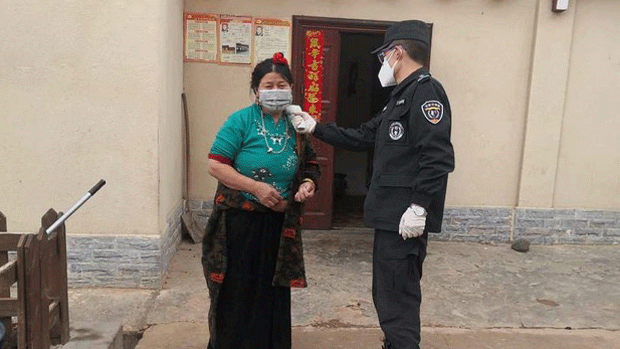Tibetet Segítő Társaság Sambhala Tibet Központ
Tibet Support Association Sambhala Tibet Center
székhely / telephely H-Budapest I. Attila út 123..
(00-36) 70 431 9343 (00-36)70 944 0260 (06-1)782 7721
sambhala@tibet.hu www.tibet.hu tibetpress.info
Facebook/Sambhala Tibet Központ Facebook/Tibett Segítő Társaság
MagnetBank/ 16200010-00110240
IBAN/HU94 16200010 00110240 00000000 SWIFT/HBWEHUHB
(1%) adószám/ 18061347-1-41
nyitva tartás/hétköznap 12.00-20.00 hétvégén előadás függő
» Retro» Tibeti művészet» Interjú» Levelek» Tibet Press» Tibet Press English» Dharma Press» Human Rights» Világ» Kína» Magyar» Ujgur» Belső-Mongólia » KőrösiCsoma» Élettér» Határozatok» Nyilatkozatok» tibeti művészet» lapszemle.hu» thetibetpost.com» eastinfo.hu» rangzen.net» ChoegyalTenzin» tibet.net» phayul.com» DalaiLama.com» vilaghelyzete.blogspot.com» Videók» Linkek» TibetiHírek» Szerkesztőség
A tibeti új évet a Lhásában otthon a vírustól való félelmek közepette ünnepeltékz
2020. február 26./RFA/TibetPress
Jelenleg csak angolul olvasható. Magyarul később.
eredeti cikk
Residents of Tibet’s regional capital Lhasa stayed at home at the turn of the Lunar New Year this week, following government orders to avoid public gatherings for fear of infection by the Wuhan coronavirus, sources in the city said.
Speaking to RFA’s Tibetan Service, one city resident said that Tibetans have been told not to come out to celebrate in crowds, adding, “They are spending Losar quietly at home.”
“In an effort to control the spread of infections, they are also not allowed to take part in religious rituals in the monasteries during Losar, but the monasteries are going ahead with their ceremonies anyway without public participation,” the source said, speaking on condition of anonymity.
Also speaking to RFA, a second source in Lhasa said that traffic flow and activities in the city’s markets and shops have not yet returned to normal.
“Everything closes down after 3:00 p.m.,” the source said. “At this crucial time of controlling the virus’s spread, everyone is making great efforts to quarantine themselves.”
“This year, my family in Lhasa spent Losar inside their home,” a Tibetan source in exile said, citing a conversation with relatives in the city. “They were told by the Chinese not to leave their houses. Nor would they be allowed to invite guests or go to others’ homes because of the outbreak.”
“Whatever they need, they order online,” he said.
Following the confirmation in February of one case, since cured, of infection in Lhasa, no new infections in the city have been reported, the Tibet Autonomous Region’s Health Commission said in a Feb. 26 statement.
“No new cases have been confirmed or suspected during the last 27 days,” the Health Commission said.
Numbers climb in Tawu
Meanwhile, two new cases were confirmed this week in Sichuan’s Tawu (Daofu) county, bringing the county total to 66, with 71 cases now confirmed for the Kardze (Ganzi) Tibetan Autonomous Prefecture in which the county is located.
Both patients—one a 66-year-old woman and the other a 62-year-old man—are residents of Tawu and had no history of traveling outside the county, the Kardze Health Commission said on Feb. 26.
“The diagnosis was confirmed on Feb. 25, and they were immediately sent to the Tawu County People’s Hospital for isolation and treatment,” the Commission said, adding, “All persons identified as having been in close contact [with the patients] are being held in isolation for medical observation."
In fallout from the Tawu infections, two Tibetan members of the ruling Chinese Communist Party have been placed under investigation for suspected dereliction of duty in failing to contain the spread of the virus in Kardze, according to Chinese state media.
Tashi Rongbu, a member of the Standing Committee for the Tawu county Party Committee, and an official named Choetha, deputy head of the county government, had permitted funerals and other public gatherings to be held in Tawu, “causing adverse social impacts,” a People’s Daily report said on Feb. 25.
Four other officials, both Tibetan and Han Chinese, have also been “warned” by Kardze authorities after being accused of ineffective handling of the coronavirus outbreak, state media said in a separate report.
Kardze prefecture’s Tawu county is now second only to Hubei province, where the infection first began to spread, as the area of China hardest-hit by coronavirus infection.
Reported by Kalsang Dolma and Guru Choegyi for RFA’s Tibetan Service. Translated by Dorjee Damdul. Written in English by Richard Finney.
